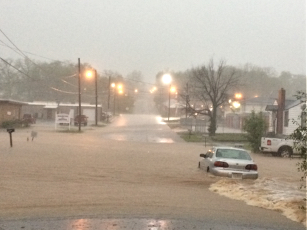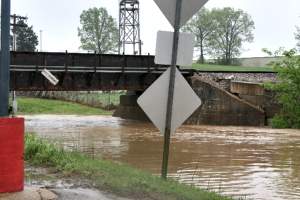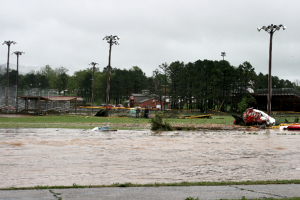
By Shawn and Tom Marhefka
Over a foot of rain fell in the city of West Plains, Missouri, in a short time on April 29, 2017. That rain, coupled with nearly two feet of rainwater from storms north of town flowing through the city’s saturated waterways, led to dozens of water rescues in town and several hundred thousand dollars of damage. Amazingly, there were no fatalities.
A low-water crossing near West Plains City Hall hits nearly 10 feet several hours after the flooding event in West Plains. Several hundred homes and businesses were damaged or destroyed by the floodwaters.
As a local radio broadcaster, the Ozark Radio Network has long supported the activation of FM chips in smartphones. But it wasn’t until a devastating flood hit our rural Missouri town and the surrounding area last year that we experienced firsthand the real importance of getting the FM chip activated.
The Ozark Radio Network, a family-owned group of five radio stations and a local news website in rural Southern Missouri, has played a vital part in serving our community during good and bad times for over 70 years. In fact, the local emergency preparedness coordinators consider us part of their communications team. The stations and website have been key players in disseminating information before, during, and after tornadoes, ice storms, and power outages. However, nothing prepared the community of West Plains and other surrounding towns for the devastation that occurred in late April of last year.
On Saturday, April 29, 2017, the area received over 18 inches of rain in a 24-hour period. 
The Missouri Ozarks, rich in natural resources, has bountiful lakes, rivers, and streams. On that Saturday, the torrential rains caused those streams, lakes, and rivers to create anywhere from a 500- to a 1,000-year flood. We are accustomed to flash floods that cover low-lying roads and bridges, but nothing like the widespread, devastating flooding that occurred that day.
Numerous homes and businesses were flooded, and many washed away. Cars were seen floating down once-dry creeks. Two major bridges were completely swept away, causing travelers to detour for nearly an hour on rural county roads, some of which were still flooded in the days following the rain. Hundreds of roads were impassable, leaving residents stranded, and in some cases on rooftops awaiting rescue.
Over 100 water rescues were performed that day in West Plains alone. Electricity in West Plains was shut down due to potential power station flooding. Cell phones and landlines were out of service. Simply put, West Plains became an island, with residents unable to enter or leave town. Local relief services had difficulties due to radio, cell, and landline devices being incapacitated during the flooding.
First, the good news about our local emergency preparedness: amazingly, there were no fatalities. The troubling news was that communications, a critical component in disasters, took a big hit during the historic floods.
Without electricity, cell/Internet service, or landlines, communication became practically impossible. Calls to 911 couldn’t be answered. Citizens were unable to tell their loved ones they were safe or even where they were at that moment.
 The one communications option that was viable during the floods was local radio. Our stations remained live and on the air during and after the floods. We became a clearinghouse of information. One of the biggest differences between the 2017 flood and past emergencies was that, in 2017, emergency personnel had trouble disseminating critical information in a timely manner to the public through the radio stations because of the phone and Internet outages and impassable roads. We did broadcast information as it became available to us.
The one communications option that was viable during the floods was local radio. Our stations remained live and on the air during and after the floods. We became a clearinghouse of information. One of the biggest differences between the 2017 flood and past emergencies was that, in 2017, emergency personnel had trouble disseminating critical information in a timely manner to the public through the radio stations because of the phone and Internet outages and impassable roads. We did broadcast information as it became available to us.
Going forward, our radio stations will be part of a two-way radio communications network set up with local emergency personnel that will pass along critical information to share with the public when other communication options fail.
Last year’s floods were our own firsthand experience on the importance of having active FM chips in mobile devices. It can and will save lives! Once you personally experience a disaster, lifesaving options become very real and important to you.
Approximately 77 percent of U.S. residents own smartphones. It is the one item most people will be certain to take with them in an emergency. An active FM chip will only enhance critical communications that can save lives. To Apple, Google, all mobile device manufacturers and service providers, please be part of serving the public like your local broadcasters and activate the FM chip!
Shawn and Tom Marhefka are the co-owners of the Ozark Radio Network, located in West Plains, Missouri. Reach Shawn at s[email protected]






I like this website because so much useful material
on herre :D.